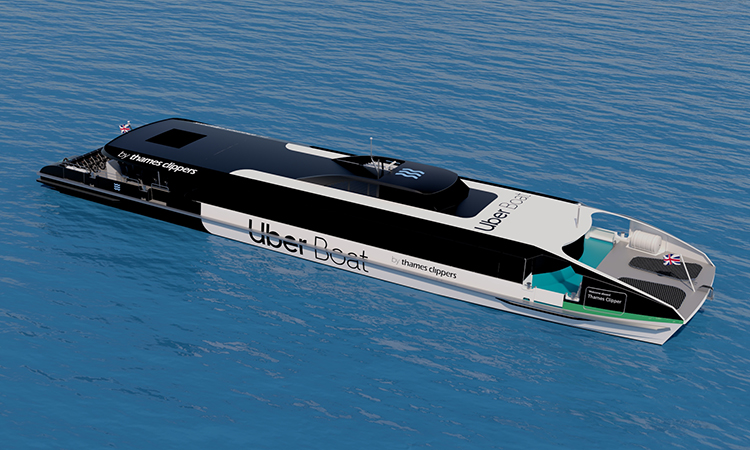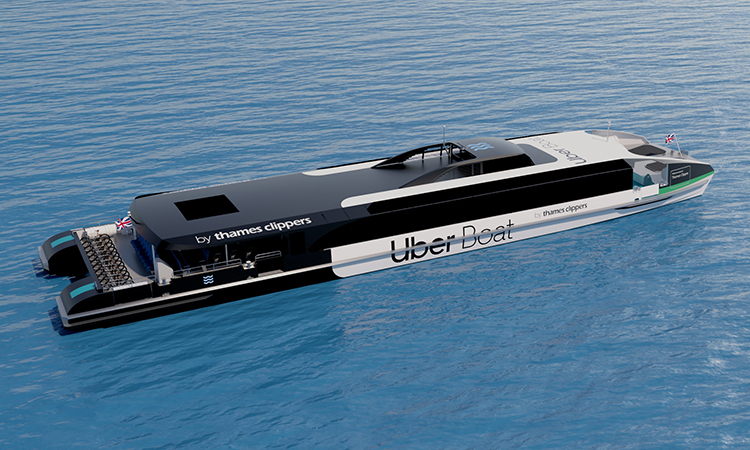London sails towards sustainability: The future of hybrid passenger vessels in the capital
- Like
- Digg
- Del
- Tumblr
- VKontakte
- Buffer
- Love This
- Odnoklassniki
- Meneame
- Blogger
- Amazon
- Yahoo Mail
- Gmail
- AOL
- Newsvine
- HackerNews
- Evernote
- MySpace
- Mail.ru
- Viadeo
- Line
- Comments
- Yummly
- SMS
- Viber
- Telegram
- Subscribe
- Skype
- Facebook Messenger
- Kakao
- LiveJournal
- Yammer
- Edgar
- Fintel
- Mix
- Instapaper
- Copy Link
Posted: 14 March 2022 | Sean Collins - Uber Boat by Thames Clippers | No comments yet
Sean Collins, CEO and Co-Founder of Uber Boat by Thames Clippers, provides Intelligent Transport with exclusive insight into the UK’s first ever hybrid high-speed passenger ferries, which will utilise a HVO biofuel hybrid system to offer commuters and leisure passengers in London with an environmentally friendly way of travelling around the English capital city.


Credit: Uber Boat by Thames Clippers - Concept image of the new hybrid high-speed passenger ferries.
Earlier in 2022, we were thrilled to announce that we’re building the UK’s first ever hybrid high-speed passenger ferries – set to join our fleet in Autumn 2022 and Spring 2023. The two new boats will take our fleet count to 23, where they will help to transport millions of commuters and leisure passengers in London each year. The new green design of these hybrid vessels is just the latest move in our strategy to net zero, delivering a future-friendly option that can be made even greener as and when technology allows.
Our new vessels represent more than an expansion of our fleet, with the hybrid technology also demonstrating our dedication to innovation”
Our new vessels represent more than an expansion of our fleet, with the hybrid technology also demonstrating our dedication to innovation. The state-of-the-art catamarans will proudly symbolise London’s sustainable transport options as they sail through the heart of the city. We’re very aware that every transport operator has a role to play in reaching emission targets, and we’re confidently leading the way for river transport nationally. The river is a largely under-used resource when it comes to transport – and these new vessels will not only increase the capacity for passengers taking to the river, but will do so in an environmentally friendly way.
Utilising alternative fuels
It’s a point of pride for us that the two vessels are being built here in the UK, at Wight Shipyard on the Isle of Wight. The boats will run under a HVO biofuel hybrid system, allowing them to operate solely on battery power while travelling through central London, between the Tower and Battersea Power Station piers. Our technology is not reliant on shore-based charging, with the new boats using excess power from the bio-fuelled engines to recharge their batteries when outside of the central London stretch of our route.
When running on electricity in central London, there will be no consumption of fossil fuel and the tailpipe emissions will be zero”
The hybrid design represents a blending of efficient bio-fuelled propulsion and clean green electric power. We’ll be using HVO, an advanced biofuel which promises excellent performance at all times of the year and is very low in sulphur. When running on electricity in central London, there will be no consumption of fossil fuel and the tailpipe emissions will be zero. As well as being the city’s most eco-friendly passenger boats, these will be Uber Boat by Thames Clippers’ quietest vessels – making the passenger experience even more enjoyable.
Fully electric boats would obviously be the ideal technology for us as we aim to improve our sustainability. Our work with the EU Horizon 2020 TrAM project to develop fully electric, zero-emission, high-speed passenger ferries demonstrates our dedication to this and, in fact, the project did influence the design for these newest vessels. However, at this moment, the hybrid system allows us to deliver the demands of our service and ensure a safe, reliable and sustainable service in the short-term. However, long-term, the goal of fully electric boats is front-of-mind and, when designing these new vessels, we are ensuring that, as and when new technologies will allow, we can make viable upgrades relatively easily to keep developing alongside the technology to become even greener.


Credit: Uber Boat by Thames Clippers – Concept image of the new hybrid high-speed passenger ferries.
Supporting the city’s emission reduction and pandemic recovery efforts
The Mayor of London, Sadiq Khan, is aiming for 80 per cent of all Londoners’ trips to be made by foot, cycle or public transport, and for the city to be carbon neutral, by 2030. Technological upgrades as seen in our fleet help to make this a reality, and we’re proud to be making progress in doing our part to reach these targets. Not only is our fleet becoming greener, but it continues to grow and offer high quality public transport options for people in the capital.
Not only is our fleet becoming greener, but it continues to grow and offer high quality public transport options for people in the capital”
After the challenges of the last two years, it is extremely exciting to be increasing our fleet capacity at this time. We are continuing to meet the demands of our customers and partners as the city recovers, and we’re currently on track to reach 50 million passengers later in 2022.
Public transport has to continue to make itself an attractive choice for Londoners and visitors to our city. The better the quality of London’s public transport, the more people will choose to use it, therefore unclogging our roads and reducing road emissions. Passengers on board an Uber Boat by Thames Clippers service have a guaranteed seat, access to an onboard café bar, fresh air and views from our deck. Domestic and international tourists use our services while they visit London, as we provide easy access to many of London’s top attractions.
Targeting net zero by 2025
Work is well underway on three green marine feasibility projects to research and develop green river transport for the future”
At Uber Boat by Thames Clippers, we have our own sustainability targets that we’re working to achieve. We are committed to reaching net zero with all new builds by 2025 and for our wider fleet, infrastructure and environmental footprint by 2040. These targets help us to direct our designs and decisions surrounding expansion. At this point, a structured fleet replacement programme will likely be our chosen route when it comes to upgrading our wider fleet. We recently hired our first Health, Safety, Environment & Quality (HSQE) Manager, Gilmark D Mello, who is dedicated to making this happen. Work is well underway on three green marine feasibility projects to research and develop green river transport for the future. Funded by the Department for Transport (DfT) and delivered in partnership with Innovate UK, the three projects look at the feasibility of zero carbon fuel types, transitioning from diesel engines to alternative fuel types and a cross-river, zero-emission ferry. The project outcomes are due in Spring 2022 and will help to further inform the business on its route to net zero. These studies are being used not only to help us develop and make our own operation more environmentally friendly, but will help to inform wider marine operations in the future.
Reinventing public transport in London
We can’t wait to continue to innovate and open up the world of commuting by river to more Londoners in a more sustainable way, making the most of our underutilised resource – the River Thames”
Our fleet upgrades help to make our River Bus service one of the most exciting public transport options in the capital. The design makes a nice compromise between the demands of our customers for the wonderful service to which they are accustomed, and the need for sustainable and clean transport options. There is a strong association between commuting by river and wellbeing, with the University of Greenwich finding that passengers that commuted in London by boat were happier than those that travelled by alternative modes of transport. It’s a well-known fact that being by water has a positive impact on mental wellbeing, and these new boats mean that our commuters can travel with a clean conscience, as well – something which is especially important as we return to offices post-pandemic. This is just the next step in our sustainability strategy, and we can’t wait to continue to innovate and open up the world of commuting by river to more Londoners in a more sustainable way, making the most of our underutilised resource – the River Thames.
Sean Collins, Chief Executive Officer and Co-Founder of Uber Boat by Thames Clippers, has been at the helm of Thames Clippers since the inception of the business in 1999. At that time, the company operated one boat with a capacity of just 62 that served three piers and employed two people. Today, Uber Boat by Thames Clippers has an annual turnover of over £18 million, carries over four million people each year and employs over 400 people. The business now operates 21 vessels – including Venus Clipper, which entered service in March 2019, and has a further two new hybrid vessels under construction.
Collins began his career aged 16 in 1984, when he was apprenticed to the Company of Watermen and Lighterman and is a third-generation Waterman. This includes serving as a Waterman to HM The Queen since 2008. During his career on the River Thames, Collins has worked as a Captain on passenger vessels and tug boats. Collins has also been National Rowing Champion and represented Great Britain at an international level, including the World Rowing Championships.
Related topics
Air Quality, Alternative Power, Mobility Services, Passenger Experience, Public Transport, Sustainable Urban Transport, Traffic Management
Related cities
London
Related countries
United Kingdom
Related organisations
Department for Transport (DfT), Innovate UK, Uber Boat by Thames Clippers, University of Greenwich
Related people
Gilmark D Mello, Sadiq Khan, Sean Collins







